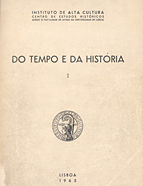

................................
The journal Do Tempo e da História [Of Time and History] was established under the framework of the Centro de Estudos Históricos [Centre for Historical Studies] at the Instituto de Alta Cultura [Institute of High Culture], affiliated with the Faculdade de Letras [Faculty of Arts and Humanities] at the University of Lisbon. The Centro de Estudos Históricos evolved from the Centro de Estudos Históricos e Arqueológicos [Centre for Historical and Archaeological Studies], which itself, founded in 1942, originated from the Centro de Estudos Filológicos [Centre for Philological Studies], founded in 1932. This makes it the oldest research centre of the Instituto de Alta Cultura associated with the Faculdade de Letras at the University of Lisbon. In 1952, the Centro de Estudos Históricos e Arqueológicos was divided into two sections: a history section, attached to the Faculdade de Letras , and an archaeology section, affiliated with the Museu Etnológico Dr. Leite Vasconcelos [Dr. Leite de Vasconcelos Ethnological Museum].
Manuel Heleno headed the archaeology section, while Virgínia Rau was appointed to lead the history section. On 26 February 1958, the Centro de Estudos Históricos e Arqueológicos was dissolved, giving rise to two separate entities: the Centro de Estudos Arqueológicos [Centre for Archaeological Studies], linked to the Museu Etnológico Dr Leite Vasconcelos , and the Centro de Estudos Históricos , attached to the Faculdade de Letras and directed by Virgínia Rau.
The primary aim of the Centro de Estudos Históricos was to promote and develop scientific research in the field of history. Since its foundation, the centre’s director consistently sought to engage high-calibre collaborators, including teachers, students, and researchers. Among the most notable contributors were Jorge Borges de Macedo (the centre’s secretary), A. H. de Oliveira Marques, José Mattoso, Eduardo Borges Nunes, Maria José Ferro Tavares, Maria José Lagos Trindade, Iria Gonçalves, and Maria do Rosário Themudo Barata.
This work is financed by national funds through FCT - Foundation for Science and Technology, I.P, in the scope of the projects UIDB/04311/2020 and UIDP/04311/2020.
